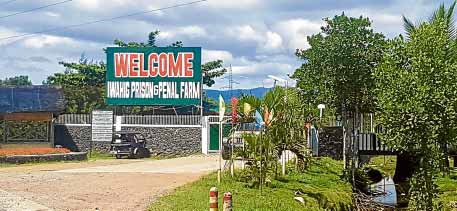Prison returnees walk out of Iwahig amid impatience on GCTA review

OPEN PRISON The 26,230-hectare Iwahig Prison and Penal Farm, established in 1904 in Puerto Princesa City in Palawan province, is the country’s largest open prison, with more than 2,700 inmates as of September this year. —CELESTEANNA FORMOSO/CONTRIBUTOR
PUERTO PRINCESA CITY, Palawan, Philippines — Forty-six people, who returned to the Iwahig Prison and Penal Farm (IPPF) in Palawan province after questions on the good conduct time allowance (GCTA) for prisoners were raised recently, walked out of the facility last week as prison officials said the group had grown impatient over the pace of review of their cases.
In an interview on Monday, Levi Evangelista, Iwahig information officer, said nine who left the facility’s holding area on Friday had returned and were now under their custody.
IPPF, also called a “prison without walls,” is the country’s largest open prison covering 26,630 hectares in this Palawan capital where inmates could work and earn, mostly in farming jobs.
The 46 were among those who yielded to IPPF officials in September after President Rodrigo Duterte ordered them to surrender for the mistaken application of the GCTA law (Republic Act No. 10592).
The President’s call to surrender was addressed to 1,914 heinous crime convicts released since 2014, based on the error-laden list of the Bureau of Corrections (BuCor). However, some 2,304 convicts across the country turned themselves in to authorities to beat the Sept. 19 deadline given by Mr. Duterte.
Article continues after this advertisementThe IPPF received 185 GCTA returnees but none had been released as of Nov. 11, the BuCor said. But itsrecords showed that 604 GCTA returnees had been released from six other facilities under BuCor.
Article continues after this advertisementNo one to blame
Evangelista assured that prison officials were attending to the returnees’ needs but the decision on their “official release” was out of their hands.
The Department of Justice (DOJ) oversight committee, which evaluates the records of GCTA returnees, has yet to issue an order on the cases of these former prisoners, he said.
“We do not have an idea yet on what will be the effect of their escape … on [the] final [decision on their] release,” he added.
But Evangelista said there was no one to blame for the walkout.
“Those who left could have gotten tired of waiting and became impatient, especially that they wanted to be with their families. We are still waiting for an order [on their cases],” Evangelista said, noting that prison officers tried to pacify and stop the returnees from leaving.
He said they were aware of the tension at the holding area but corrections officers could not do anything about the situation because the returnees were technically “free men.”
Evangelista said IPPF officials ordered the transfer of 33 returnees left in the holding area to the Inawagan subcolony so they could be near their families.
“We immediately granted their request to be transferred to Inagawan. They said they still wanted to be freed without hitches and their names cleared,” he said.
Evangelista appealed to those who walked out of the IPPF to return to the facility and await the results of the GCTA review.
“We call on them to return so the outcome would not become worse. They should just return and wait for their release so it wouldn’t affect [their situation]. They should heed our call to avoid being arrested again,” he said.
In Manila, Maj. Albert Tapiru, spokesperson for the BuCor, said the 46 should not be tagged as “escapees,” since they were not convicts anymore.
“But personnel from BuCor and the police are currently searching for them, where they would be brought back to the holding area,” he added.
Safety
But Tapiru asked them to return to the IPPF, assuring them that they would be safe inside the prison complex.
“I hope they come back here and just be patient for the processing of the DOJ to be finished so their release will be legal,” he said.
The GCTA law came under scrutiny after news broke that Antonio Sanchez, former mayor of Calauan, Laguna province, would be walking free in August after he reportedly completed his 40-year prison term for rape and murder through the application of GCTA credits.
The revelation prompted the Senate to investigate, leading to the resignation of former BuCor chief, Nicanor Faeldon.
A joint committee of the DOJ and the Department of the Interior and Local Government also revised the implementing rules and regulations (IRR) of RA 10592, which categorically excluded heinous crimes convicts from benefitting from the law.
A group of inmates asked the Supreme Court to strike down as unconstitutional provisions of the new IRR which exclude recidivists, habitual delinquents, escapees and those charged with heinous crimes from benefiting from the expanded GCTA, time allowance for studying, teaching and mentoring and special time allowance for loyalty.